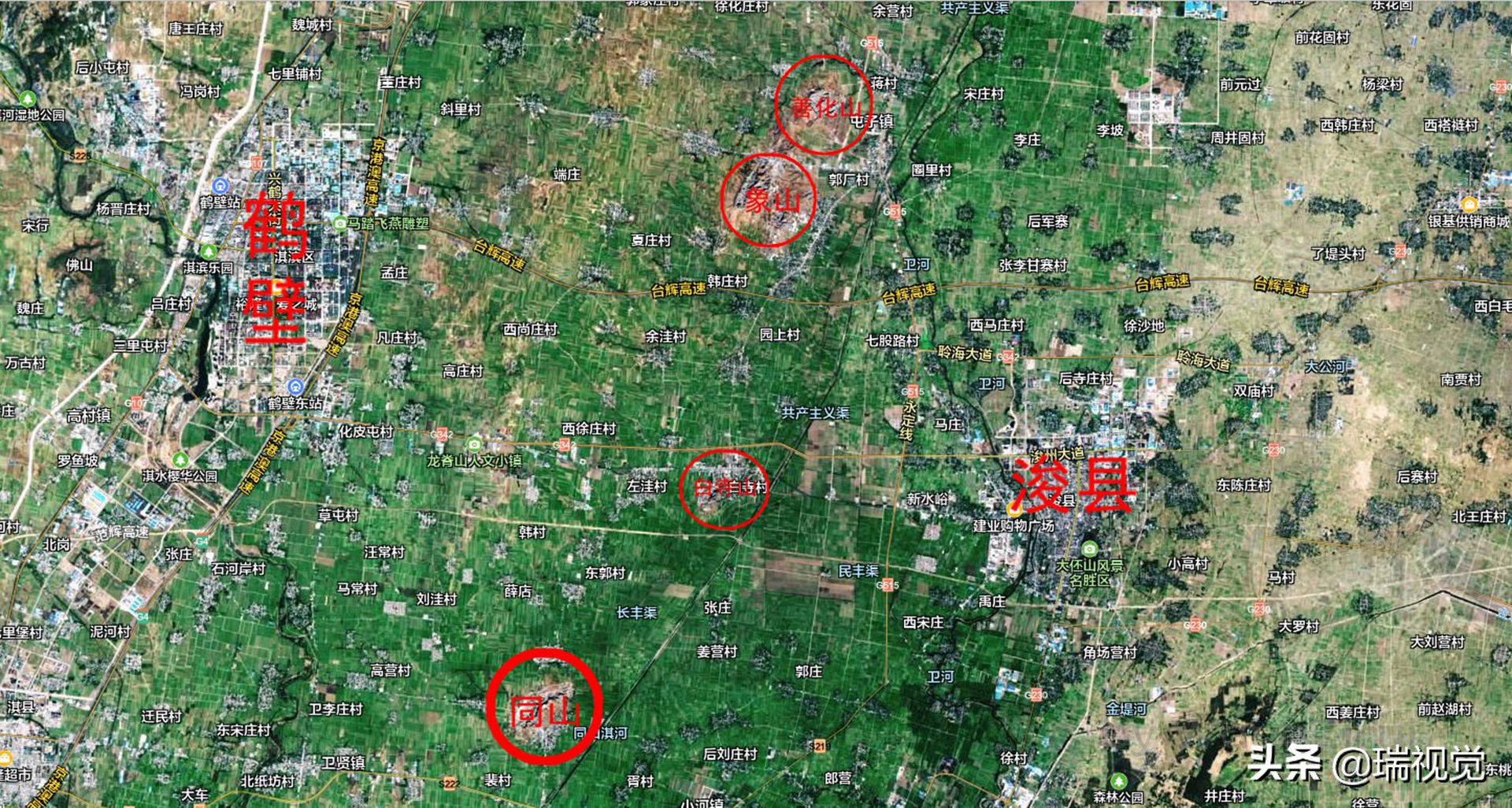In Xun County, Hebi City, Henan Province, on the northern plain of Henan Province, there are not only the county seats of Da Ling Mountain and Fuqiu Mountain, but also a total of eight stony mountains such as Shanhua Mountain, XiangShan Mountain, Baisi Mountain and Tongshan Mountain, which are also the remnants of the Taihang Mountains.

The Tongshan, Baisi, Xiangshan, and Shanhua Mountains in the western part of Xun County are not connected to each other from south to north, and it is unknown whether they are connected underground.
The image above shows the geographic location of the same mountain (at the red double circle) shown on the map.
Tongshan is located 16 kilometers southwest of the county seat of Xun County. It runs from southwest to northeast, is about 2.1 km long, about 1.75 km wide, has an altitude of 145 m and a relative height of 84 m.
"Erya" said: "The mountain has no grass and trees for children." Tongshan is also known as Tongshan Mountain because of its bare bluestone and no vegetation.
The two sides of the summit of the same mountain are equally inclined, like the backbone of the ox, forming three main peaks and two secondary peaks, and the locals call the five peaks Wudao Mountain, also known as the same mountain as Funiu Mountain.
According to legend, King Wu once met with the princes here, so it was named Tongshan.
The picture above shows the aerial photograph of the same mountain by the drone, up the north and down to the south, and the lower part is the same mountain village.
Ever since the day it got its name, Tongshan has been inextricably linked to war. The struggle for hegemony among the princes, the Game of the Three Kingdoms, the change of the Sui and Tang Dynasties, as well as the fight against the Japanese Kou, the War of Liberation, and even the peasant uprising, the bandits and the mountains, etc., were all wrapped up in the same mountains and constantly burned.
Due to the diverse uses of its mountain stone, people have been mining for hundreds of years, especially after the improvement of mechanization operations, shanhua mountain, elephant mountain, white temple mountain, tongshan and other mountains have gradually disappeared, and the mountain has slowly become a pit, like a sore on the earth.
The image above is a screenshot of the same mountain shown by the satellite map.
Tongshan is a place where religious culture and folk beliefs come together.
During the Republic of China, the same mountain was full of temples and halls.
There are 56 main temples on Toudao Mountain, including the Dressing Building, the Twelve Old Mother Halls, the Great Buddha Hall, the Guanyin Hall, and the City God Temple.
Erdao Mountain has more than 40 temples mainly based on the Great Buddha Hall of Heavenly Lord, surrounded by walled walls on all sides, and there are mountain gates on the south side.
There are more than 30 temples on SandaoShan, mainly the Jade Emperor Hall.
There are more than 20 temples on Sidao Mountain, mainly the Nanding Laoye Temple.
Most of the temples were destroyed during the pre-liberation war and the post-liberation "four olds" period.
After 1992, the villagers gradually restored and rebuilt the old temple on the old site.
The many temples on the mountain are in danger from a distance.
Tongshan stone has a variety of uses, and after hundreds of years of mining, the mountain is no longer like a mountain.
Rainwater accumulates in mining pits, like "heavenly ponds" on the mountain.
Its turquoise color makes it look like an "emerald lake".
Emerald Lake? Golden Lake?
Aerial photography by drones, found another kind of "beauty" of the same mountain, not a high perspective can not feel.
There is a saying that the Ming Dynasty Confucian general Wang Yue (a native of Xun County), who is comparable to the god of war, gambled and deliberately lost the same mountain to Changyuan, which led to the local people digging and mining wildly.
Aerial photography of the same mountain mine pit by drone.
The satellite photo on the right of the image above is an image of the same mountain from decades ago; on the left is the image of the present.
The vicissitudes of the mulberry field make people can't help but sigh.
The picture above shows the front and back tongshan villages on the south side of Tongshan taken by drones three days ago.
The two administrative villages of Former Tongshan and Houtongshan are collectively known as Tongshan Village, which is located 6 kilometers west of the government headquarters of Xiaohe Town. Qiantongshan Village covers an area of 498.9 acres, with a population of 2180 people and a land area of 4150.1 acres; Houtongshan Village covers an area of 506.2 acres, with a population of 2037 people and a land area of 3573.9 acres.
A netizen said: The Shou surname of Tongshan Village in Xun County and the Shou surname of our Tongshan Town in Zhuji, Zhejiang Are one! The old ancestor followed King Kang nandu and was enfeoffed in Tongshan Town, where the name of Tongshan Town originated from Tongshan Village!
Located in the southwest of Zhuji City, Zhejiang Province, Tongshan Town is bordered by Anhua Town to the east, Baima Town of Pujiang County to the south, Zhongyu Township of Pujiang County to the west, and Caota Town and Paitou Town to the north.